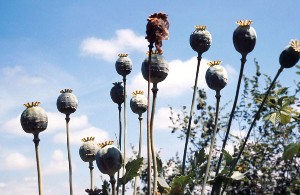Newsbrief:
European
Drug
Think-Tank
Calls
for
Legalizing
Afghan
Opium
Crop
--
Afghan
Government
Reaction
Mixed
3/18/05
A Paris-based drug policy think-tank, the Senlis Council, called last week for Afghanistan's record illicit opium crop to be regularized, with farmers licensed to grow poppies for medicines such as morphine and codeine. After some initial hesitation, the Afghan government shot down the idea this week -- or not. Conflicting statements came from government ministers.
"Afghanistan is on the verge of becoming a narco-state, said Senlis executive director Emmanuel Reinert. "That could happen in the next few years. So we are somehow in a crisis situation. The solutions at hand right now either will make things worse -- like eradication or forced eradication through aerial spraying -- or they will just yield results in several years. I'm thinking of alternative development that will take several years to yield results. And that would be, in a way, too late." Instead, said Reinert, the opium trade should be regularized, licensed, and directed toward medical channels. "The world's largest supply of opium could be turned into essential medicine such as morphine and codeine rather than heroin," said Reinert. "Our solution would allow farmers to carry on producing opium for the legitimate and useful legal market instead of the illicit trade in heroin. Reducing the amount of heroin produced by Afghanistan's poppy crop would shift the drug trade and its profits from the drug lords and terrorists to the people of Afghanistan," Reinert added. Such a solution would allow farmers to produce legal opium for legitimate interests, and to produce such essential medicine as morphine and codeine in the face of a huge shortage of those products in the world and, more specifically, in developing countries, Reinert said. "The idea is not to turn Afghanistan into a mono-crop economy. The device is here as a transition to complement what is done to develop the country and eventually to have a diversified Afghan economy that is a sustainable and stable economy. The first step would be to launch one or two pilot projects in very specific regions, so you could have clear control of the farmers who cultivate those lands, to look at the way the license could work." Under the current global drug prohibition regime, countries must apply for a license from the International Narcotics Control Board to legally grow and sell opium for medicinal purposes. Countries that currently produce opium under license include Australia, France, India, and Turkey. But while Reinert and the Senlis Council said the proposal was at its earliest stages and the group planned to present a feasibility study for the idea at an international opium conference in Kabul in September, the Afghan government of President Hamid Karzai had rejected the notion by Monday. Or at least part of the government had. Afghan Interior Minister Ali Ahmad Jalai ruled out legalizing opium production in a Kabul press conference. "Changing this and legalizing it from my point of view is not that easy and it is not possible," he said. "We cannot just legalize it." Oddly, he argued that opium could not be licensed and sold for medicinal purposes because "the money which made from drugs finances crime, terrorism, and also using this money some groups form private militias." But that is precisely the status quo, and a regulated opium market would presumably regularize those financial flows. That next day, Afghan Minister of Counter Narcotics Habibullah Qaderi was a bit more open to the proposal. "It is a new idea, and proper research has to be done to look again at all sides of it; the control mechanism, permission from the International Narcotics Control Board, and the United Nations Office on Drugs and Crime," told the UN's Integrated Regional Information Network. But Qaderi expressed concern about how the trade would be regulated. "Unless there is a proper policing system, provincial officials who are not corrupt and a forum for the profits to be used for the development of the entire country, then the idea is not workable," Qaderi said.
|

